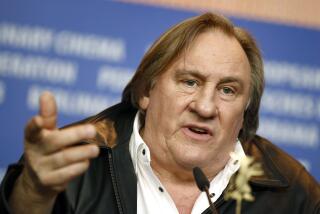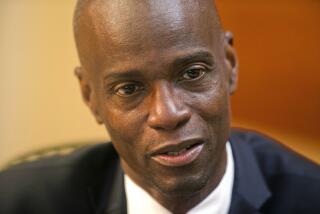‘Carlos the Jackal’ goes on trial in France
The man known as Carlos the Jackal, once one of the world’s most feared and hunted terrorism suspects, went on trial in a Paris court Monday for a series of bombings nearly 30 years ago.
Venezuelan-born Ilich Ramirez Sanchez was smiling and defiant as he was accused of being the mastermind behind four attacks in France in 1982 and 1983 that killed 11 people and injured nearly 200.
Asked to state his occupation, Ramirez, 62, replied that he was a “professional revolutionary,” adding, “of the Leninist tradition.”
He then insisted that although he had been born in Venezuela he had been given Palestinian nationality by the late Palestinian leader Yasser Arafat, whose cause he espoused.
With his gray hair, beard and reading glasses and needing a chair for his “bad back,” Ramirez bore little resemblance to the photographs of him with dark hair, Che Guevara beret and sunglasses when he was at the height of his notoriety in the 1970s. While on the run from police in his heyday, he was reported to have had plastic surgery to change his appearance.
However, he had clearly lost none of his ability to provoke, giving a clenched-fist salute to a supporter on the public benches and leaping up to rage, in heavily accented French, about the “racist, Zionist state of Israel.”
The outburst drew a round of applause from a group of young men at the back of the courtroom, prompting a warning against disorder from the president of the court, Olivier Leurent.
“I witnessed my first shooting at 13, when my best friend died in my arms after the police gunned him down,” Ramirez said, leaping to his feet. “I have lots of respect for the victims, but there are many people, innocent people, who find themselves in the wrong place at the wrong time.”
Ramirez is already serving a life prison term for the killing of two French secret service agents and an informer in Paris in 1975. He was also suspected of being the mastermind in a plot to take hostages at an OPEC oil ministers meeting in Vienna in 1975, which left three people dead.
The self-styled Cold War revolutionary was seized by French intelligence agents in Sudan in 1994.
The trial, expected to last six weeks, centers on four bombings, two against high-speed trains in France. Prosecutors say the attacks were aimed at putting pressure on French authorities to release his then-girlfriend, Magdalena Kopp, and fellow revolutionary Bruno Breguet.
Three other members of his organization, also accused in the bombings, are being tried in absentia: Johannes Weinrich and Christina Frohlich, both of whom Germany has refused to extradite, and Ali Kamal Issawi, a Palestinian who is reportedly on the run.
Ramirez denies any involvement in the attacks.
“He’s in a fighting mood, as always,” said his lawyer and wife, Isabelle Coutant-Peyre, who married Ramirez in prison in 2001, after he converted to Islam. The French state does not recognize their marriage.
Francis Szpiner, a lawyer for some of the civil parties to the case — victims and relatives of the dead — said the trial was important to show there was no time limit on pursuing terrorists and to mark “the end of the culture of impunity.”
Bernard Ripert, lawyer for one of the accused, said the statute of limitations for the charges was 10 years, not three decades.
“Nobody is asking anyone to forgive or forget,” he said, addressing the victims in the courtroom. “We demand the law be respected, that’s all.”
Willsher is a special correspondent.
More to Read
Start your day right
Sign up for Essential California for news, features and recommendations from the L.A. Times and beyond in your inbox six days a week.
You may occasionally receive promotional content from the Los Angeles Times.






